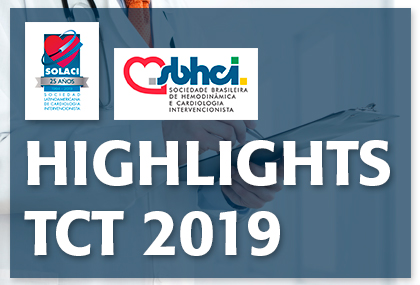Courtesy of SBHCI.
Between 16 and 18% of coronary artery lesions in patients with chronic stable CAD are chronic total occlusions (CTO). CTO revascularization could benefit symptomatic patients, but it remains unclear whether such complex procedure is safe in the long run, given the study outcomes on PCI in CAD so far.

This study presented at the scientific sessions of TCT 2019 randomized multivessel patients with at least one CTO to DES stenting on severe lesions and further functional ischemia assessment vs. optimal medical treatment.
The study included 407 patients from 26 centers and 8 countries to recanalization plus optimal medical treatment (OMT) (n=259) vs OMT alone (n=137). Both successful CTO intervention + OMT and OMT alone patients were assessed with a functional test at 12 and 36 months.
There were no differences in hard end points (infarction or death) between the groups, but patients with successful recanalization did present better quality of life, less frequent angina, better functional class and less physical limitation.
18.2% of OMT patients and 7.3% of PCI + OMT patients needed new ischemia driven revascularization after 3 years.
Conclusion
This study is the first to show a benefit of PCI over OMT in symptomatic CTO patients. There was significant event reduction in the PCI group basically driven by symptom improvement and better rate of re
Courtesy of SBHCI.
Link to the SBHCI publication HERE
Original Title: EURO-CTO: 3-Year Outcomes From a Randomized Trial of PCI vs. Medical Therapy in Patients With Chronic Total Coronary Occlusions.
Author of the Original Article: Gerald S. Werner.
Get the latest scientific articles on interventional cardiologySubscribe to our weekly newsletter
We are interested in your opinion. Please, leave your comments, thoughts, questions, etc., below. They will be most welcome.





